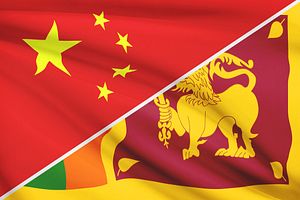Just a day after traveling to Maldives, Chinese President Xi Jinping began a visit to Sri Lanka on Tuesday as part of his South Asia tour that will also include a visit to India. His brief stay in Colombo will mark the first trip by a Chinese president to that country. Coinciding with his arrival in Colombo and in a somewhat unusual diplomatic move, Sri Lanka’s Daily News published an op-ed authored by the Chinese president himself that presents an illuminating view of how the Chinese leader views bilateral relations with Sri Lanka.
The language in Xi’s op-ed is lofty and rife with symbolism and references to history. The language also heavily emphasizes the burgeoning maritime partnership between Sri Lanka and China. Xi recalls a “1,000-year-old bond” between China and Sri Lanka, first through the spread of Buddhism and later through the travels of famed Chinese seafarer Zheng He. Xi’s allusion to Zheng is particularly noteworthy as Zheng’s maritime exploits are experiencing somewhat of a revival in China amid the country’s own naval modernization initiatives. Evoking Zheng ostensibly positions China as a peaceful and outward-looking power in Asia.
When it comes to Sri Lanka, Xi is remarkably laudatory. Xi’s article begins by referring to Sri Lanka as a “Pearl in the Indian Ocean,” commending the country for “displaying great vitality in the 21st century.” He additionally notes that the bilateral relationship between China and Sri Lanka is a positive example of “how countries of different sizes can live in amity and cooperate with each other for mutual benefit”—something Xi can’t really say about China’s relations with smaller states in Southeast Asia, for example. Bilateral ties between Sri Lanka and China have been steadily improving since Mahinda Rajapaksa came to power in Sri Lanka. Building on growing trade and investment ties, Xi and Rajapaksa will begin a free trade agreement (FTA) dialogue. China’s current ambassador to Sri Lanka estimates that the two leaders will conclude over 20 agreements.
Xi’s South Asia tour will feature China’s new “Maritime Silk Road” (MSR) initiative quite strongly and his message to the people of Sri Lanka focused heavily on how the maritime complementarities between Sri Lanka and China render them natural partners. Xi has also called on Maldives to join the China-led MSR. The MSR currently stands as a nebulous peg in China’s foreign and economic policy in Asia, roughly entailing a revival of ancient sea-based trade routes that connected China to Africa and the Mediterranean by way of South and Southeast Asian ports. Indian Ocean island countries like Sri Lanka and the Maldives are natural points of interest for Beijing. Beijing will likely clarify its vision for the MSR further at the Asia-Pacific Economic Cooperation (APEC) summit later this year.
Growing ties between Colombo and Beijing will likely continue to cause anxiety for New Delhi. Given Sri Lanka’s geographic proximity to India, concerns are growing among Indian strategists that China is nurturing its relationship with Sri Lanka as a peg in a containment strategy aimed towards New Delhi. Ahead of Xi’s South Asia tour, Chinese government officials remained adamant that China’s interests in South Asia are benevolent and economic in nature. Ahead of Xi’s trip to the region, Liu Jianchao, China’s assistant foreign minister, noted that China “has never, and will not, use so-called military or other means to try and hem in India.” He further added that “There is no strategic competition between China and India in our relationship and there is certainly no such word as ‘surround.’”
Returning to Xi’s op-ed, it’s evident that Beijing is keen to avoid perceptions that it is seeking to convert its approach to bilateral diplomacy with smaller states in South Asia into a zero-sum game with India. Xi essentially ends his op-ed with a declaration that the Indian Ocean is big enough for everyone, including India and China. In a rhetorical flourish, Xi ends his op-ed by citing a line from a Chinese poem: “The ocean is so vast that the fish may leap about happily; and the sky is so high that birds may glide freely.”
Xi’s stop in Colombo will last just a day before he heads to New Delhi on September 17. In a break from convention, India will host Xi in the city of Ahmedabad and not the capital, New Delhi, as is tradition with state visits. Ahmedabad is the largest city in the Indian state of Gujarat, the home state of Narendra Modi, the current Indian prime minister.

































